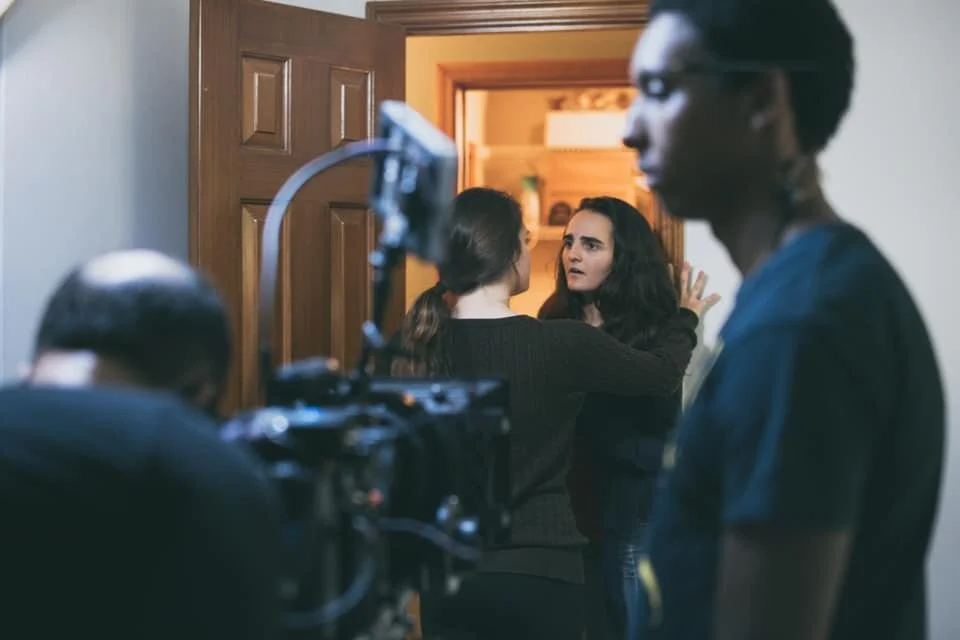Advocating for Yourself as an Actor (Intimacy)
This is a super popular topic amongst the actors I know and have worked with. Especially in the time of COVID-19 where unemployment is skyrocketing, the economy is suffering and there is less of a likelihood that companies will be able to hire an Intimacy Director. How do I, as an actor, advocate for myself under all the pressure that comes with saying ‘Yes’ and being easy to work with?
First and foremost. Be communicative. Ask for clarification, have discussions and collaborate.
But how do I do that without being pushy or annoying?
Let’s use the ‘classic’ scenario:
They Kiss.Great. How? Why?
Questions to ask yourself (the actor):
- “Where are my physical boundaries today and with this person (my scene partner)?”
- “Have my characters kissed before?”
- “What type of kiss do I imagine this being?” Brainstorm adjectives: consider the movement quality of the character; contemplate adjectives to describe your character’s relationship, investigate the circumstances and stakes of the moment.
- “Why is this kiss happening?” Given circumstances, people!!
- “What does this kiss mean to my character?” Do that character development, y’all.
Conversation with your director:
- “What do you picture this kiss looking like? Can you give me adjectives or metaphors to describe it?”
- “About how long do you imagine this kiss being?”
- “Why is this a kiss rather than a hug or another form of intimacy?” (This question can sound condescending so only ask it if you feel safe and if you cannot answer the question yourself. It also might be helpful to insert an example rather than say “another form of intimacy.”)
Conversation with your partner (fellow actor engaging in the kiss with you):
- “How are you today?” Check-ins are wonderful.
- “Where are your Boundaries/Fences/Out-of-bound areas today?”
- “If I were to touch you on your body as I am kissing you, where are you comfortable with that being? What would be natural for you?”
- “I have the impulse to _________. How do you feel about that?”
- “As the character, I want to _____, and as the actor, I want to ________.” [i.e. Chelsea Pace’s De-Roling Method]
If these questions seem excessive, that is because we either don’t normally have these conversations or because we are used to assuming the answer. It is important to take the time to have these conversations, even if it is just with yourself. It helps us deconstruct the moment and fill it with motivation and purpose so we don’t approach it mindlessly.
Warning: these conversations can feel awkward. I was coaching my roommate before a rehearsal the other day and she was blushing and remarking about the fact that I was talking about ‘kissing with tongue’ in public. Yep. It’s different to be blunt. But it doesn’t need to be awkward; it doesn’t need to be an off-limits conversation. If fact, if you are engaging in the act, there needs to be enough safety to at least have the conversation.
The next thing I would recommend is to know your limits. You have a responsibility to yourself and those you work with to know your boundaries. If you are working on a film, there will be a Nudity Rider in your contract. Don’t let this be the only way you protect yourself going into it. Be clear at the audition about your limits, if possible. Discuss triggers/off-limits areas with your partner(s) and/or director(s) before rehearsals begin if you feel safe to do so. Really evaluate whether or not to audition for the role if there is something in the script that you feel queasy about doing.
My final piece of advice that I will mention is that times are changing. Most directors, agents, and choreographers want to do better. They will work with you if you open up confidently. They will begin to respect your boundaries as just another aspect of working with you. If they threaten you for advocating for yourself, consider that this project may not be right for you. You are the person you go home with at the end of the day and wake up with every morning. You need to be able to live with yourself and feel safe in your own body. We are actors. We are artists. Our integrity and self-worth are not up for sale.
